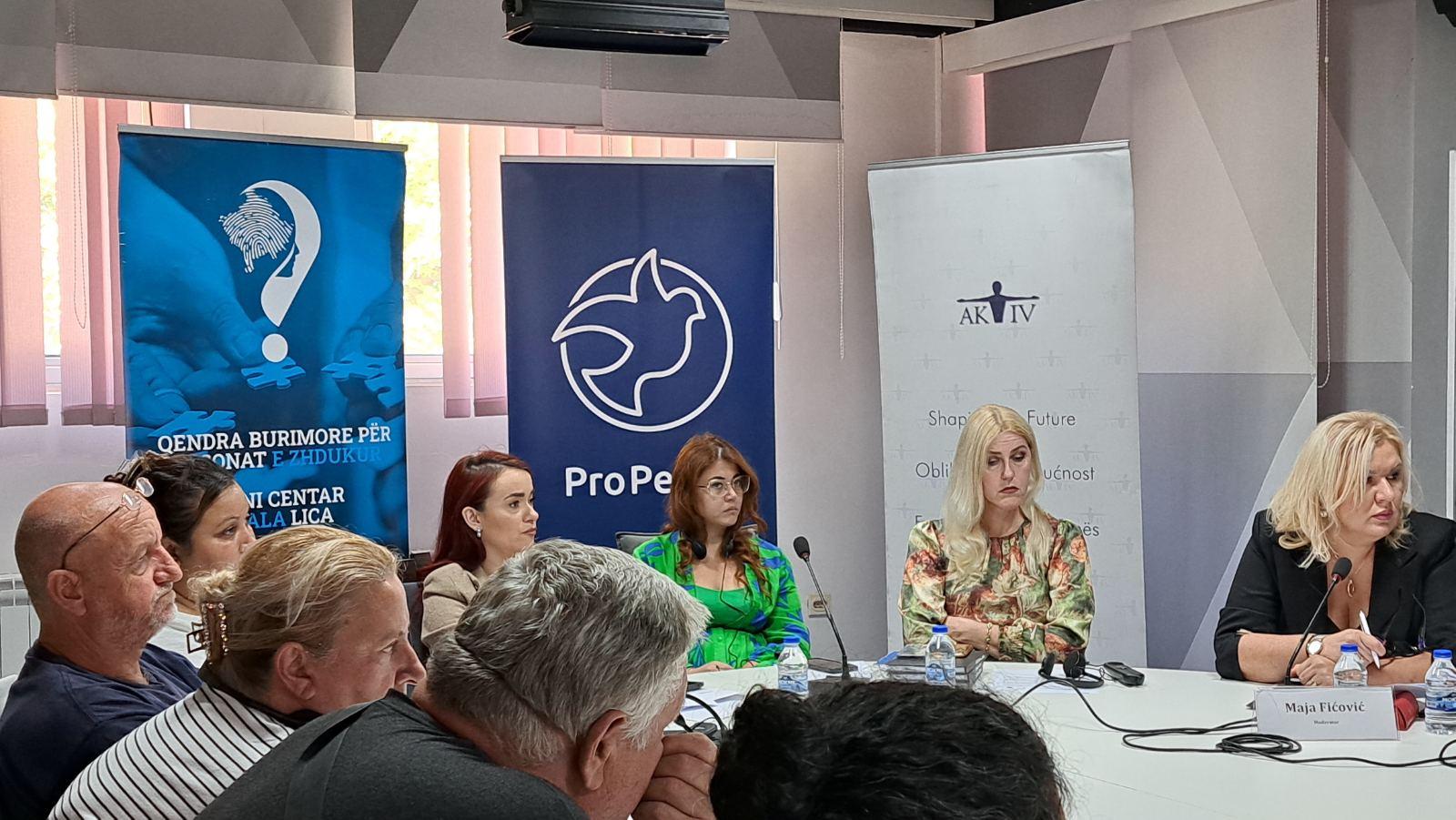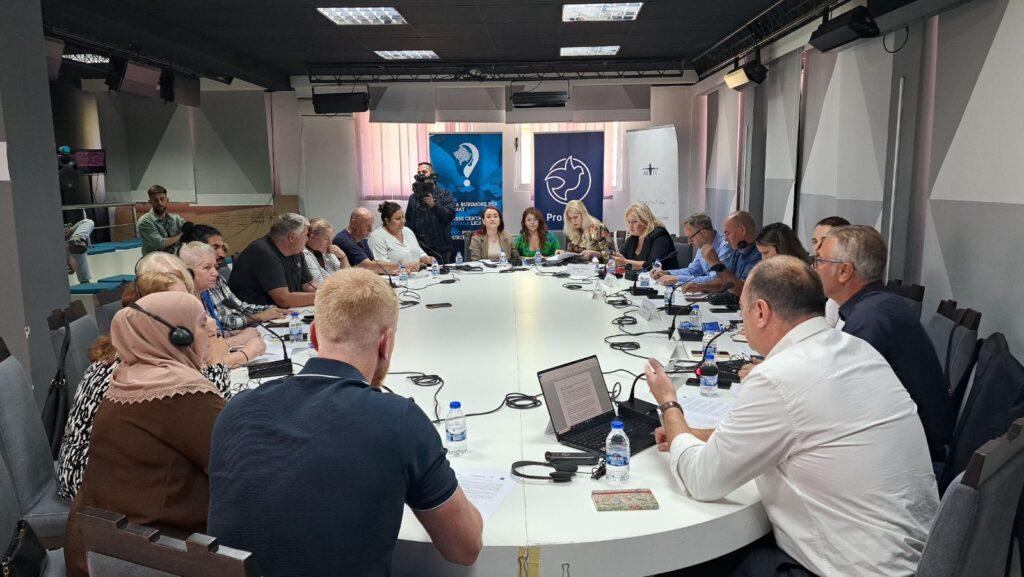Around 1,600 people in Kosovo are still listed as missing. These are not just numbers, but untold stories, unopened graves, and unfinished lives. Concrete steps toward truth and justice are urgently needed. This was the key message of the conference “Paths to Closure: Families and Societies Facing the Legacy of the Missing”, held on September 25, 2025, at the Civic Energy Center in North Mitrovica, organized by NGO Aktiv, the Missing Persons Resource Center, and Pro Peace Kosovo.
The event brought together families of the missing, representatives of civil society, and international missions. Participants emphasized the need for a joint, transparent, and cross-sectoral approach to accelerate identifications and exhumations, build trust, and end the practice of decision-making behind closed doors.
In his opening remarks, Miodrag Milićević, Executive Director of NGO Aktiv, stressed that the issue of missing persons remains one of the greatest challenges today, noting that they are not just numbers but the ongoing uncertainty of families.
“Institutions dealing with this issue face serious challenges every day, such as a lack of resources, slow and insufficiently transparent information exchange, as well as obstacles in inter-institutional cooperation. International actors, as well as institutions in Pristina and Belgrade, must show greater commitment and operational capacity in order to speed up the process and make it more transparent. It is our responsibility not to allow this issue to fall into oblivion, but to encourage joint efforts to reach truth and justice.”
Nataša Božilović, Coordinator of the Missing Persons Resource Center in Pristina, pointed out that families’ rights are still being violated. “Our primary task is to protect the rights of families of the missing, regardless of their ethnic or religious affiliation, and to ensure that they have access to information.”
She stressed that even more than two decades after the end of the war, families continue to face serious problems, particularly the lack of information, which denies them the right to truth and justice.
“Unbelievable as it may sound, after so many years families still lack even the most basic information about the fate of their loved ones. That is why we organize such gatherings across Kosovo, to provide families with essential information and create opportunities for them to meet directly with institutions dealing with this issue. It is crucial that the process does not remain only in Pristina or Belgrade but that we are present in the communities where families live and wait for answers.”
Nehari Shari, Director of Pro Peace Kosovo, reminded that this organization has been supporting families and fostering cooperation between Albanian and Serbian associations for more than two decades.
“Our main focus is dealing with the past, and at the heart of this process lies the issue of missing persons. We have organized numerous trainings, commemorative activities, and meetings of families, because we believe this is the only way to open space for dialogue and mutual understanding.”
Negovan Mavrić, Deputy Director of the Resource Center, whose brother went missing in 1999, spoke about the endless pain of families.
“Living in a family where someone is missing is a pain that never heals. I wouldn’t wish it on anyone, not even my worst enemy. When someone is missing from your home, it leaves a wound no one can overcome. My brother was kidnapped after the war, when we thought the madness had ended, but the suffering continued. I know what it means to live in constant fear and wait for a phone call—that is an experience I wouldn’t wish on anyone.”
He recalled the case of Bajram Çerkinaj, former director of the Resource Center, who searched for his son until the end of his life. “To fight for 27 years and die without learning the fate of your child is a burden no family should bear. He fought for all the missing, regardless of nationality or religion.”
Mavrić said that institutional responsibility is still lacking, while families only want to know where the remains of their loved ones are so they can bury them with dignity. He mentioned an ongoing investigation of a potential mass grave site near Novi Pazar.
“I believe no family knows anything about this, regardless of whose remains they are. Everything is kept from the public, probably for political reasons. For us families, the most important thing is to keep searching, while politicians seem unaffected by this pain.”
Luisa Marinho, Head of the Forensic Medicine Team at EULEX, underlined that searching for and identifying missing persons are two inseparable and equally challenging aspects of the same process.
“Our team works together with Kosovo experts at the Institute of Forensic Medicine. The first and greatest difficulty is access to information after so many years, finding witnesses or people who can provide useful leads, but memories fade over time. Then there are the challenges of the terrain, changed landscapes, hidden or covered burial sites, all of which make the search extremely difficult. Another challenge is identification. When remains are found, they are often not in good enough condition to extract DNA. Without DNA analysis, it is difficult to establish identity. This is why it is essential that families provide DNA samples, as without them the process is nearly impossible.”
Saša Ilić, Director of the Center for Peace and Tolerance, recalled the early attempts to document missing persons in 1999 and 2000.
“At that time, we recorded reports from families. The risks were enormous, freedom of movement was almost nonexistent, and families often searched for the truth on their own, sometimes relying on false testimonies and suffering financial losses. We realized that a much stronger NGO with an international character was needed to protect families.”
He noted that even after 26 years, traces are fading and witnesses are losing patience, but families continue to persist.
“The most important thing is to understand that the tragedy of the missing does not belong to just one community. It is shared, by Serbs, Albanians, and others. Only if we accept this can we close this chapter with dignity. Humanity must come before politics.”
At the conference in North Mitrovica, it was concluded that the issue of missing persons remains an open wound and one of the key challenges for the region. Families demand truth and justice, while civil society and international actors stress the need for greater transparency and stronger political will. It was warned that without clear responses from institutions in Belgrade and Pristina, as well as stronger international pressure, the process will continue to stagnate.
Families of the missing emphasized that every recovered and identified body brings at least a fragment of peace. But until that happens, the burden of uncertainty continues to weigh on their lives. That is why the issue of the missing must remain a priority, not a sidelined topic or bargaining chip in political negotiations.











